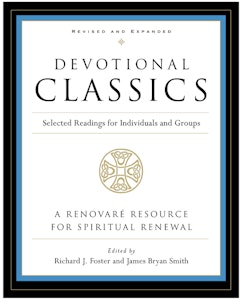Introductory Note:
Catherine of Genoa (1447-1510) is noted for a deep spirituality that is evidenced in both her writing and her care and love for the poor and sick. In this excerpt from her main work, Life and Teaching, she offers insight into the pure love of God and the human struggle of accepting that love.
Zane Creamer
 Excerpt from Devotional Classics
Excerpt from Devotional Classics
EXCERPTS FROM Life and Teachings
1. Little by Little
The creature is incapable of knowing anything except what God gives to it from day to day. If it knew beforehand what God intends for it, it would never be at peace. At times I have thought that my love was complete, but later, as my sight grew clearer, I became aware that I had many imperfections. I did not recognize them at first because God’s love for me has it planned that I will achieve it little by little for the sake of preserving me and keeping me humble so as to be tolerable to myself and others!
Every day I feel the motes in my eyes being removed as God’s pure love casts them out. We cannot see these imperfections because if we saw them, we could not bear the sight. Thus, God lets us imagine that we are complete. But never does God cease to remove them. From time to time I feel that I am growing only to see that I still have a long way to go. They become visible to me in the mirror of God’s Truth, of his Pure Love where everything I thought was straight appears crooked.
2. The Keys of My House
Our self-will is so subtle and so deeply rooted within our own selves and defends itself with so many reasons, that when we try to fight against it, we manage to lose in the end. We end up doing our own will under many covers — of charity, of necessity, or of justice. But God’s love wills to stand naked and without any cover since it has nothing to hide.
I have seen this love. Indeed, every day I feel myself more occupied with him, and I feel a greater fire within. It is as if I have given the keys of my house to Love with permission to do all that is necessary. I became so consumed with this love that as I stood contemplating this work within me, I felt that even if I were cast into hell, hell itself would have appeared to me all love and consolation.
3. No Comfort Except in God
I find my mind more restricted upon God every day. It is like a man who at first is free to roam the city, and then is confined to a house, and then to a room, then to a smaller room, then to the cellar, and finally bound and blind-folded until there is no way of escape. With no comfort except in God who was doing this all along through love and great mercy, I came to a place of great contentment.
4. Living Without Self-Will
God and sin cannot live peaceably side by side. After considering things as they truly are, I felt a desire to live without self-will. When God gives light to the soul, it no longer desires to live with that part of it that continues to block the light. The soul desires to offer itself entirely to God so that it can no longer live except in the manner willed by his tender love. In this manner, it will begin to produce works that are pure, full, and sincere. These are the works that are pleasing to God.
Since I am determined to join myself to God, I find that I am also bound to be the enemy of his enemies. And since I find nothing that is more his enemy than the self that is in me, I am constrained to hate this part of me more than any other. Indeed, because of the war that exists between it and the Spirit, I am determined to separate it from myself and treat it as nothing.
5. Renouncing the Care of Ourselves
I then saw others who were fighting against their evil inclinations and forcing themselves to resist them. But I saw that the more they struggled against them, the more they committed them. So I said to them, “You are right in lamenting your sins and imperfections, and I would be lamenting with you if it were not for the fact that God is holding me. You cannot defend yourself and I cannot defend myself. The thing we must do is renounce the care of ourselves unto God who can defend our true self. Only then can God do for us what we cannot do ourselves.”
As to the renouncing of ourselves, I told them, “Take a piece of bread and eat it. When you have eaten it, its substance goes into you to nourish the body and the rest is eliminated because your body no longer needs it. For the body is more important than the bread; it was created as a means, but it is not to remain forever with us. Likewise, we must remove all evil inclinations from our bodies; they cannot live on within us, lest we die.”
6. Content to Wait upon God
God gives us his light in an instant, allowing us to know all that we need to know. No more is given to us than is necessary in his plan to lead us to perfection. We cannot seek this light; it is given to us from God only as he chooses. Neither do we know how it comes, or how we even know that it is! If we try to know more than we have been made to know, we will accomplish nothing. We simply wait like a stone, with no capacity until he brings us life.
Therefore I will not weary myself with seeking beyond what God wants me to know. Instead I will abide in peace with the understanding God has given me, and I will let this occupy my mind. If we are to see properly, we must pluck out of our eyes our own presumption. If we gaze too long at the sun, we go blind; in this manner, I think, does pride blind many of us who want to know too much.
When God finds a soul that rests in him and is not easily moved, he operates within it in his own manner. That soul allows God to do great things within it. He gives to such a soul the key to the treasures he has prepared for it so that it might enjoy them. And to this same soul he gives the joy of his presence which entirely absorbs such a soul.
7. God’s Clever Strategy
The selfishness that is within us, however, is so contrary to God that God cannot induce us to do his will except by a clever strategy: promising us greater things than what the world can give — even in this life — and promising a kind of consolation that the world does not know. God does this, I think, because he knows how much we are attached to pleasure. He knows that we are the kind who will not leave our one little toy unless we are offered four!
8. Vision of the Life to Come
If we could see what we will receive in the life to come (as a reward for what we have done here), we would cease to occupy ourselves with anything but the things of heaven. But God, who desires that we see by faith and who desires that we not do good because of selfish motives, gives us this vision little by little, sufficient to the level of faith of which we are capable. In this manner, God leads us into a greater vision of that which is to come until faith is no longer needed.
On the other hand, if we were somehow informed that we were about to die, and that the life that awaits us will be miserable because of our sins, and that we would have to suffer eternally, I feel sure that we — for fear of it — would rather let ourselves be killed than commit one single sin! But God — as unwilling as he is that we avoid sin out of the motive of fear and therefore never lets us see it — will show it in part to souls who are clothed and occupied with him.
9. Steadfast Trust
May this be our prayer: “I do not want to turn my eyes from you, O God. There I want them to stay and not move no matter what happens to me, within or without.” For those who trust in God need not worry about themselves. As I think about you, my spiritual children, I see that God’s pure love is attentive to all of your needs. It is because of this tender love that I need not ask anything of God for you. All I need to do is lift you up before his face.
Excerpts taken from Devotional Classics: Selected Readings for Individuals and Groups (Richard J. Foster & James Bryan Smith, Editors. HarperCollins, 1993.).
· Last Featured on Renovare.org February 2024


